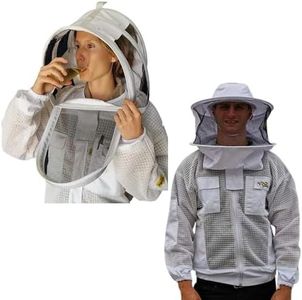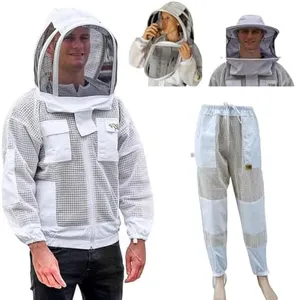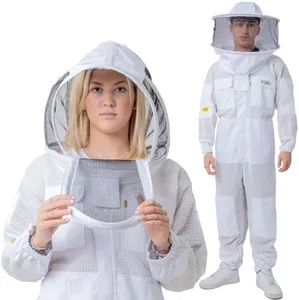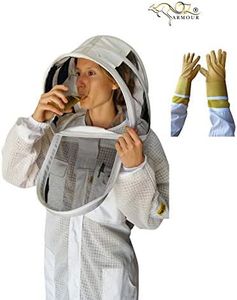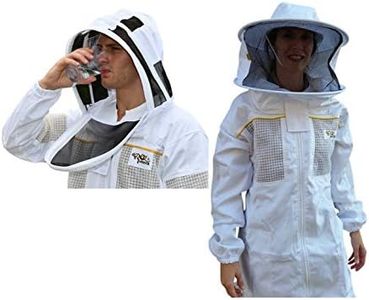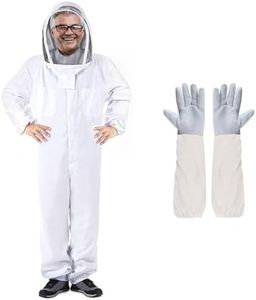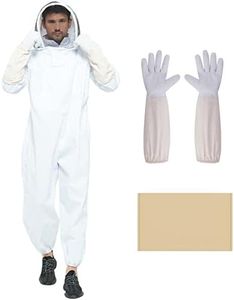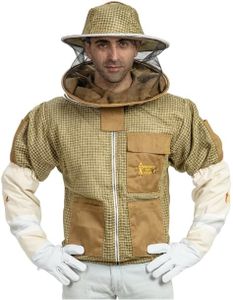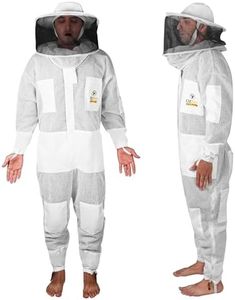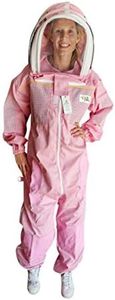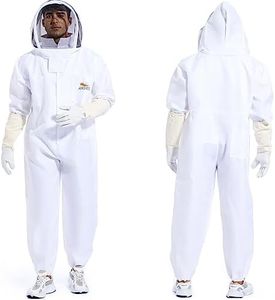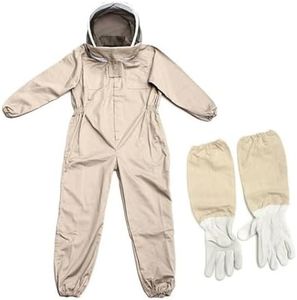We Use CookiesWe use cookies to enhance the security, performance,
functionality and for analytical and promotional activities. By continuing to browse this site you
are agreeing to our privacy policy
10 Best Beekeeper Suits
From leading brands and best sellers available on the web.By clicking on a link to a third party's website, log data is shared with that third party.
Buying Guide for the Best Beekeeper Suits
When shopping for a beekeeper suit, your main goal is to find something that offers you enough protection from bee stings while also being comfortable to wear for longer periods. It's important to think not only about how well the suit keeps bees out but also how it feels on hot days, how easily you can move in it, and how simple it is to put on and take off. Knowing what features matter most for your beekeeping style, whether you’re checking hives occasionally in your backyard or managing many hives, will help you make the best choice.MaterialThe material of a beekeeper suit is what stands between you and the bees, and it also affects how hot or comfortable you feel. Most suits are made from cotton, polycotton blends, or modern synthetic mesh fabrics. Thick cotton offers strong protection but can get very hot and heavy, making it suitable if you need the best sting resistance and won’t be working for very long. Polycotton balances protection and breathability, which is great for typical hobby beekeepers. Mesh or ventilated suits are designed to let air flow and keep you cool while still defending against stings; these are ideal if you live in a warm climate or plan to work longer in the suit. Think about how much you prioritize protection vs. comfort and temperature management to choose what matches your needs.
Veil TypeThe veil is the head covering that protects your face and neck, with clear visibility being crucial for safety and handling bees. There are several types: round, fencing (square or oval), and collapsible veils. Round veils give good visibility and airflow but can be bulky. Fencing veils are close-fitting and move with your head, which makes moving around hives easier. Collapsible veils offer the most convenience for storage and transport. Your choice should balance comfort, how easy it is to see out of, and your preference on how much protection you feel around the face.
Fit and SizeA well-fitting beekeeper suit should cover your whole body while letting you move freely. If it’s too tight, it can be uncomfortable, and bees are more likely to sting through fabric pressed against the skin. Too loose, and gaps can form that let bees sneak inside. Most suits are sized generically (S, M, L, etc.) with some being more generous to fit over clothes. Check sizing guides carefully and consider whether you usually wear extra layers beneath. Think about your normal range of movement and skincare needs, and try to choose a fit that covers you well without restricting you.
VentilationVentilation is how well the suit allows air to move, keeping you cool during work. Some suits have mesh panels or are made completely from layered mesh fabric for maximum airflow, while traditional ones can be very warm and sweat-inducing, especially under the sun. If you keep bees in a hot region or expect to spend long periods working, prioritize strong ventilation. For colder areas or brief hive checks, this may be less important.
Zippers and ClosuresClosures are all the zips, elastic, Velcro, and snaps used to seal the suit at important points like wrists, ankles, and the main entry. High-quality zippers are sturdier, less likely to break, and often have covers to prevent bees from sneaking in. Elastic and Velcro at openings are important to prevent bees from finding their way inside. Pay attention to how reliable the closures feel and whether they’re easy to use, especially if you’ll be putting the suit on and off frequently. Good closures are crucial, especially if you plan to work around active or defensive hives.
VisibilityVisibility refers to how easily and clearly you can see through the veil. A good veil shouldn't fog up, scratch easily, or block your view with unnecessary seams. High visibility is important for working confidently and for safety, since you need to see both your bees and your tools clearly. If you expect to do precise work, choose a suit with a veil that's praised for its wide, clear view.
Ease of CleaningBeekeeper suits get dirty quickly with propolis, wax, and sweat, so they should be easy to wash. Some materials wash better than others and may tolerate regular machine washing, while some require careful hand washing. If convenience matters, check care instructions to choose a suit you can wash often without worrying about it wearing out quickly.
